- Home
- Peter Matthiessen
In Paradise Page 2
In Paradise Read online
Page 2
AFTER OSWIECIM’S JEWS were transported to the Cracow ghetto, their houses were occupied by Christians, that snoop’s forebears doubtless among them. And the girl’s family, too, perhaps, in their old “Yittish” house. Were you young people never told, he says, that after the war, when those few returning refugees made their way back home to Poland to reclaim their lives, they were reviled and driven off and sometimes bludgeoned and occasionally, when too persistent, killed? “Nearly two thousand Jews were murdered in this country after the war,” he says. “Didn’t you know that?”
“Murtered?” They have stopped their fooling. They look shocked—less by the statistic, he suspects, than by their passenger’s intensity. “No, sir! Sorry! We were never learned such things!”
“Why sorry? You weren’t born yet.” His tone is too dismissive: the boy’s regret had been sincere. “At home, at school is what I meant.”
Mirek is silent. The two heads in the front seat, facing forward, seem hypnotized by the thwack-wack-wack-thwack of ragged windshield wipers dragged across cold muddied glass.
Why challenge them that way, idiot? What did you expect? He scowls in the same instant that his scowl is caught by the boy’s scared eyes in the rearview mirror, reading the stranger’s expression the wrong way.
FAR FROM BEING ISOLATED in some grim landscape, as postwar newsreels led one to imagine, the high-fenced compound, now a state museum, is located between thoroughfares at the edge of town. Though night has come, the gate into its forecourt is untended, open to the street, and the black wrought ironwork of the gate arch, gleaming in the rain, is still in place a half century later.
Frantic to be of use, the girl pieces out the sign: “Is meaning, ‘Verk Make Frei’!” And the boy hushes her. “You are okay, mister?”
Mirek has slowed to a near stop as the little car approaches the gate, but his passenger waves him on through. All three look back over their shoulders, as if that portal, left unwatched, might close silently behind.
The night court is empty. A two-story building on the far side of the court is outlined by the glare of prison light; its few windows appear lightless. Pulling up short of the entrance, Mirek keeps the motor running. They stare about them, making no move to get out.
In a voice gone hoarse, the passenger inquires, “How do you feel? Being here, I mean? How does it feel to come to such a place? In your own country?” The young Poles exchange looks of alarm. Why would their guest ask them such a thing so many years after those shrouded times that even the old people claim they can scarcely remember?
He presses them. Hadn’t they noticed that old railway embedded in the road? Surely they knew that before those first transports of Jews arrived from western Europe, thousands of Polish prisoners had already been exterminated in this place—your own damned people, boys and girls, he wants to yell, right here behind these walls! Wake up!
When they answer at last, they speak in whispers. They say, It was too long ago. They say, We cannot even imagine it. They say, We don’t know how to think about something so incredible—not, he notes, “so terrible” but “so incredible,” so far beyond belief, as if no sane intelligence could comprehend, far less accept, that such enormous horror could take place in this quiet neighborhood of the girl’s hometown.
She is sniffling. Mirek jumps out, wrenches open the door, yanks out the scuffed valise by its leather straps. They want him gone. He tries in vain to compensate them for the petrol, entreats the girl to at least accept with his sincere best wishes this bit of amber she had liked so much in Cracow. “Please, please, sir,” she whispers, tears in her eyes. “Is beauty gift for Mama!”
They depart at once, leaving him alone with his father’s suitcase, his spurned amber. When the little car scoots through the gate, the petal of the girl’s pale face appears in her blurred window, and he lifts his hand in a half wave—all there is time for. The little auto flees up the empty avenue, tires whistling on the wet pavement. Couldn’t those kids have waited long enough to make sure the guest of Poland had been let in?
Not that he’d deserved much courtesy. They had been kind to lug him thirty miles on a winter road to this cloaca maxima, and he had repaid them with pedantic hectoring and pried at them with an irritable meanness that he cannot blame on jet lag or fatigue, or not entirely. What is it, then? You damn well better pull yourself together.
Hearing something, or perhaps not, he whirls to confront the dark building behind him, relieved to find the heavy door outlined with light. Eventually it opens at his rapping and a woman, finger to her lips, urges his silence. This is the former admissions building, yes. He’d been expected earlier.
He eats a plate of leftover cold fare alone in the SS mess hall, windowless and tomb-walled as a subway station; he follows big red arrows up a steep sharp-cornered stair to an SS dormitory converted to cramped quarters for those few visitors with reason to stay the night fifty years later. A corridor with scaling paint leads to a narrow room where a man occupying one of the twin cots rolls over and feigns sleep to spare them both the toil of introductions.
A casement window overlooks the inner compound. Shards of fractured light expose silhouettes of regimented barracks, hard-edged as a prison on a stage set. At the far end of this street—or so he is presently advised by a voice that erupts in phlegmy coughs behind him—stands the former residence of the late commandant of SS Konzentrationlager Auschwitz I, handy to the gallows site of his postwar hanging.
His informant has twitched his sheet aside, baring a mouth red as a wound that splits the stubble on a long Scandinavian face. “Why do you stare, if I may ask? You never see a Nordic Jew before?” Upon which this visage with its crafty leer is withdrawn under the blanket, together with a muffled snort he thinks might have been laughter.
He lies there travel-spent, unable to sleep, much closer than he likes to that alien male body on the other cot. The oppression seeping from these walls, he thinks, can only be deepened by his own misgivings as to why he has come here in the first place, together with his dread of the next days. His fault, of course. But what has he gotten himself into?
“You really have no choice about it, do you?” his stepmother had said. “No,” he’d said, still gazing at that photo. “Not anymore.” Then, very quietly, she’d said, “Your father had no choice about it either, yet he never went. Why do I suspect that’s the reason the poor guy did it?”
THREE
In the mess hall next morning, over hard dark bread with margarine and worn-out coffee, he is caught up on the mission of this retreat by his roommate, Dr. Anders Stern, the “Nordic Jew” with the long loony face. Altogether, Stern explains, some one hundred and forty pilgrims from twelve countries have committed themselves to a week of homage, prayer, and silent meditation in memory of this camp’s million and more victims, and “through personal testimony,” reads the manifesto, “to bear witness lest the world forget man’s depthless capacity for evil if such horror is to be diminished in the future.”
A primatologist and evolutionary biologist with strong opinions on the fatal role of the human species on the tree of life, Anders Stern is one of those perverse intellectuals who enjoy the role of the buffoon. He wears wool britches with suspenders and a peasant’s rubber knee boots and a big manure-hued overshirt. Blue eyes, pale hair set off oddly by black brows; deep furrow lines between those eyes as in the scowls of primitives; that wet red mouth with the out-thrust lower lip that ensures a not quite comic air of grievance. He speaks more loudly than he needs to, overtalks others, interrupts. Belching noisily out of habit, he declares he is attending this retreat in the hope that in all-day silent meditation in a death camp, he might arrive at some insight on mass sadism that could cast light on the evolutionary purpose of so-called human evil—
“So-called evil, you say?” a woman’s voice complains. “Evolutionary purpose?”
Listening to Stern at the mess hall tables
are a number of retreatants, mostly middle-aged and older people, humbly spoken and uncomfortable when noticed. Many are practiced in the silent meditation that is the organizing principle of this retreat and all have at least a scraped acquaintance with the English language. The majority, Stern informs his roommate a bit loudly, are Jews and Christians from Israel, the United States, and Western Europe, most of them German; others include a young Palestinian and a makeshift Tibetan Buddhist from New Jersey named O’Brien. “Unaffiliated” is a Mr. G. Earwig, no indicated nationality, and last-minute arrangements have been made for a late arrival, Dr. D. Clements Olin, Polish-born American poet and scholar, who is not formally enrolled but has attached himself to this retreat to take advantage of the economy of these lean accommodations and their proximity and access to the camp itself.
Dr. Olin is duly introduced by Stern to the retreat’s unofficial “spiritual leader,” nicknamed Ben Lama, a genial, bearded, near-bald psychologist left over from the flower-power days of a psychedelic California youth (“Master of Tibetan Tantra and ex-hippie ex–Orthodox Jew,” snorts Anders Stern, who is much amused by the ecumenical mix here from America).
AT UNIVERSITY in Massachusetts, Clements Olin had immersed himself in the literature of the Third Reich and the Shoah. Eventually, he’d been appointed full professor of twentieth-century Slavic literature, with emphasis on its great modern poets—Akhmatova, Herbert, Milosz, Szymborska—and a special interest in the survivor texts; he is presently completing a monograph on Tadeusz Borowski for a university press.
Although he is offered readings and lectureships in Warsaw and is well-traveled elsewhere in Europe, this journey to his native region never seemed to come about until this year, when his father’s sudden death was followed closely by word from his meditation group in Cambridge, notifying practitioners about a pioneer retreat in the winter. Suddenly, with mixed feelings, he was on his way—not “going home to Poland,” he assured his friends and colleagues, no, no, certainly not. True, he would be passing through his ancestral region while completing research on the role of death camps in the work of the ambiguous Borowski, doomed author of the brilliant, controversial This Way for the Gas, Ladies and Gentlemen. Indeed, half the weight strapped into his father’s old valise consists of research notes and outlines, early drafts, paperback volumes of the literature, also galley proofs of a new collection of those excellent Slav poets edited by D. Clements Olin, Ph.D. (His Borowski monograph is not the only reason he has come, but he sees no point in mentioning the other, which he considers sentimental or at least too personal, too likely to invite the wrong sort of attention.) He is here as a researcher, he informs Ben Lama. As a stranger in Poland, with no close family lost in the war, he has no authentic witness to contribute and will probably stay only two or three days.
“A researcher.” Ben Lama nods slowly twice or thrice before murmuring, “I see.” Though he says it pleasantly enough, his “I see” seems a bit cryptic to Olin, perhaps even a mild rebuke, and who could blame the man? With immense archives of evidence and testimony so readily available, Ben must be thinking, what sort of “research” can be left for this poor fool to do? What could his research possibly contribute that has not, long since, with lacerating eloquence, been flayed upon the page?
Olin tends to agree with the many who have stated that fresh insight into the horror of the camps is inconceivable, and efforts at interpretation by anyone lacking direct personal experience an impertinence, out of the question; in the words of the survivor-writer Aharon Appelfeld, “The Holocaust belongs to the type of enormous experience that reduces one to silence. Any utterance, any statement, any ‘answer’ is tiny, meaningless, and occasionally ridiculous. Even the greatest of answers seems petty.” He will never pierce through to the “something incredible” mentioned by that boy Mirek, to that twisted black shrunken “coil of evil” cited by Poland’s great Yiddish writer I. B. Singer. So what can he hope to understand here? He would never dare attempt to name it even if he could imagine such a thing, a bead of illumination glimpsed from a poet’s oblique angle, some fleeting apprehension which might clarify, for example, the enigma of Borowski’s abrupt suicide at age twenty-eight, at the pinnacle of his celebrity and just three days after the birth of his first child to his longtime lover.
ON THIS FIRST MORNING a film documentary made by the liberating armies will be followed by a guided tour of this base camp, Auschwitz I; in the afternoon and for the next five days, all day in every weather, the retreatants will trek the long mile across the fields to the extermination camp KL Vernichtungslager Auschwitz II to offer prayer at its gas chambers and crematoria and all-day silent meditation on the long railway ramp known as “the selection platform.”
Although Professor Olin is not registered as a participant, he is experienced in meditation practice, and Ben Lama invites him to join the retreat schedule, coming and going as he pleases. This morning, he forgoes the screening on a strong instinct to confront the death camp all alone on this first day, undistracted by the dismay of others.
LEAVING AUSCHWITZ I, he crosses the main railroad tracks, following directions to the outlying farmland community known as Brzezinka, “The Birches”—in German, Birkenau. Years before, Olin’s father had described to him this countryside he knew well as a boy and later as a young cavalry lieutenant, the army stables and broad pastures, the farms, orchards, and shaded lanes of its quaint hamlets. Not until 1940, as reported by Borowski, were those communities razed to create a buffer zone around the camp, with the inhabitants presumably resettled in the confiscated houses of the Jews.
Beyond the tracks, he follows an ice-puddled dirt road through the fields, along a ditch line of hard-cropped winter trees. In the distance, delicate as netting, high fences drift forth through a brownish fog. Soon the hazy outline of the main sentry tower thrusts up from a red wall of end-to-end brick buildings, slapped up in haste in 1942, Borowski wrote, by Russian prisoners from the eastern front before they perished of starvation. Below the tower, like the mouth of an ogre’s cave, an arched railway tunnel bores through the prison walls into the impoundment.
Uneasy, he enters by a broken gate and ventures through. Where the tunnel opens out into the camp, the railway splits into three tracks served by parallel ramps that separate two vast barbed-wired enclosures. Where these platforms draw to a point and end, pale ruins like immense mushrooms lie half-hidden in thin woods.
On the north side, in its own fenced compound possibly a mile across, stand the foundations of what is left of the small city of old stables used as barracks for male prisoners, long ramshackle sheds with black earth floors and missing slats and myriad chinks open to the weather. All but the sheds nearest the entrance had been burned down at war’s end by the Red Army, leaving a wasteland of charred chimneys like black stumps in the wake of forest fire.
Vast emptiness, terminal silence, under a gray overcast withholding snow. “Bearing witness”? Dear God. In the echo of such desolation, what more witness could be needed? Vernichtungslager. Extermination camp. The name signified all by itself a mythic barbarism and depravity.
Could there be seasons in this place or is it always winter? He could be breathing the air of the Dark Ages.
Reading Borowski was Olin’s first exposure to the swarming scenes of terror on this platform, the howls of lost children running everywhere and nowhere “like wild dogs,” the young mother so frantic to be spared that she forsakes the little boy calling Mama! Mama! who runs behind her (“Oh no, sir! He’s not mine!”), casting away the last of her humanity for a few more hours of excruciating life. Who could hear the despair of that child, the cries of all those children being stripped of their brief moment on this earth, without suffering this urge that he feels now, a half century too late, to beat and kick those dolled-up SS pigs into a jelly—
Stop! To rage this way over dead history is ludicrous. Among the participants in this retreat, the several sons and daughters
of defunct SS may well be the most agonized of all, and their ordeal will be stark enough without the unearned indignation of some damned onlooker from abroad who has no connection to the place and no meaningful witness to contribute.
He has faltered, needing to compose himself, find his breath before proceeding. But when he starts forward with intent to walk the platform all the way to those half-hidden ruins in the woods, he stops again almost at once, feeling somehow threatened. In a moment, he retreats, edging backward into the tunnel mouth like some night creature in response to a dim instinct not to expose itself outside its lair.
CLEMENTS OLIN is not sorry to have missed the film, having seen enough of that grim footage elsewhere; the last time, numb, he had shifted in his seat every few moments to rouse himself to his moral duty and absorb more punishment. He’d felt ashamed. But even horror becomes wearisome, and by now every adult in the Western world has been exposed to awful images of stacked white corpses and body piles bulldozed into pits—no longer human beings, simply things, not nearly as shocking as a photo from the SS archives of two live wild-haired women crying out through the small barred window of their cattle car. Crying out to whom? Their fellow men? Perhaps this fellow man taking their picture? In the absence of their God, who could have heard them, let alone set them free?
Images of howling victims protesting insane fate had always horrified him more than those apparitions clutching at barbed wire, too far gone even to grasp that these rough figures outside the fence, pointing cameras at their pitiful condition as children might point fingers in a zoo, are the saviors prayed for throughout thousands of hours, day and night and night and day for months and years until prayers guttered in their throats and their eyes stared in the way they would in death.

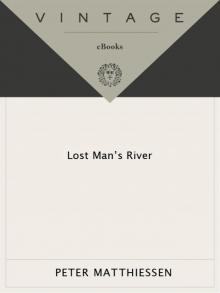 Lost Man's River: Shadow Country Trilogy
Lost Man's River: Shadow Country Trilogy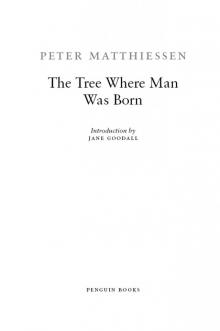 The Tree Where Man Was Born
The Tree Where Man Was Born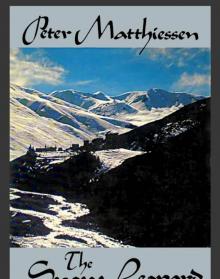 The Snow leopard
The Snow leopard Sand Rivers
Sand Rivers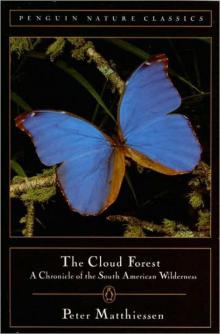 The Cloud Forest
The Cloud Forest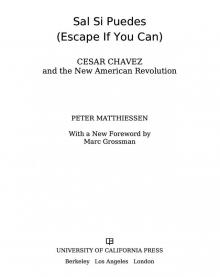 Sal Si Puedes (Escape if You Can)
Sal Si Puedes (Escape if You Can)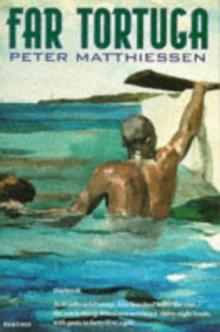 Far Tortuga
Far Tortuga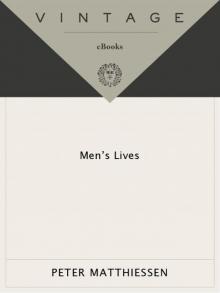 Men's Lives
Men's Lives On the River Styx: And Other Stories
On the River Styx: And Other Stories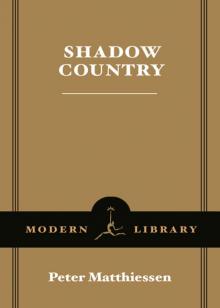 Shadow Country
Shadow Country At Play in the Fields of the Lord
At Play in the Fields of the Lord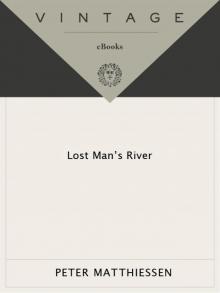 Lost Man's River
Lost Man's River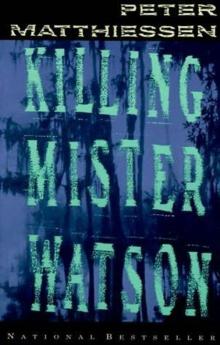 Killing Mister Watson
Killing Mister Watson On the River Styx
On the River Styx